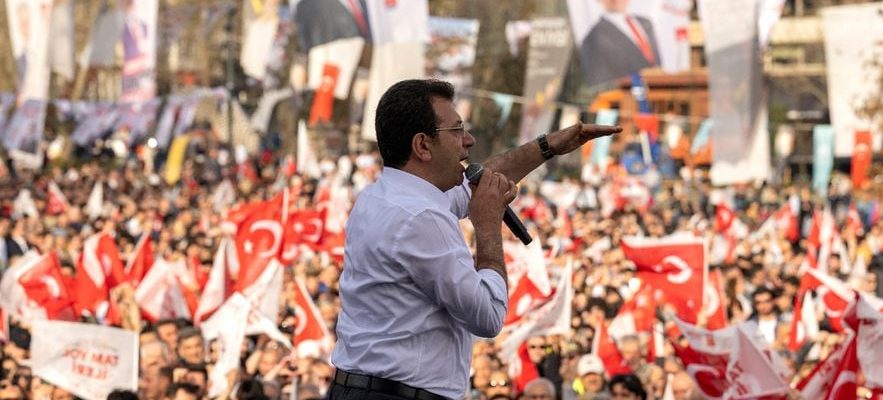Perhaps sensing the defeat to come, Recep Tayyip Erdogan expressed himself as follows just before the March 31 vote: “For me it is a finale, the last time that I participate in an election.” Skillful, the skilled politician knows perfectly how to play on the heartstrings of his electorate who have supported him since 2003 and appreciate the bond of populist sympathy that has been forged over the years. However, this time, this sentimentality was not enough. Not only did the Turkish president fail to reconquer the country’s major cities, but he also lost new ones. With 35.5% of the vote, the Islamo-nationalist AKP party founded by Erdogan became for the first time in twenty-one years of existence the second party in the country behind the Republican People’s Party (CHP, 37.7%). of voices), created by the secularist Mustafa Kemal Atatürk in 1923.
For Erdogan, the defeat is stinging. “However, he had anticipated that a victory, particularly in Istanbul, was not at all certain and he was therefore careful not to get personally involved in the campaign as much as in 2019 so as not to damage his image in the event of defeat”, points out political scientist Ismet Akça for whom the “Reis” (Chief) is far from ready. Despite the debacle of his party, the latter retained control of the country and all powers for another four years. Time to redress the political situation and change the Constitution in order to be able to appear before the voters again or, failing that, to elect a hypothetical runner-up – probably his son-in-law Selçuk Bayraktar, who heads the Turkish combat drone manufacturing program , now world famous.
The economy is in an impasse
The reason for his defeat? First of all, it is the bad economic situation. “The economic austerity policy put in place a year ago aimed at avoiding a major crisis has not yet borne fruit,” remarks Ismet Akça. In March, annual inflation was still estimated at 67%! And this according to official figures which are highly contested by independent economists for whom the situation is even more serious. “The middle class has disappeared, retirees are being squeezed by the throat,” continues the political scientist. “During the presidential election in 2023, Erdogan multiplied the gifts to his electorate; this time, budgetary orthodoxy requires, he was not able to do the same.” The head of state is now counting on the austerity policy of Minister of Treasury and Finance Mehmet Simsek, who has the confidence of foreign investors. In the medium term, this could bear fruit, help reduce inflation, attract capital and return to the prosperity of the first decade of Erdogan’s long reign.
The mayor of Istanbul Ekrem Imamoglu, opposition figure in Turkey, in front of his supporters, in Istanbul on March 30, 2024
© / afp.com/Yasin AKGUL
Until then, how to bounce back? After last weekend’s crushing defeat, the “Reis” has two options: launch into a policy of outstretched hands or, on the contrary, continue to polarize society while accentuating its authoritarianism. “The government had suggested that in the event of victory, it would embark on a policy of appeasement but this was only an electoral argument,” continues Ismet Akça. It is hard to imagine the Turkish leader giving up his full powers, freeing imprisoned opposition figures and relaunching a peace process with the Kurdish guerrillas.
An offensive against the Kurds to create a diversion
There remains therefore the winning recipe of recent years: polarizing society around questions of morals and religion and posing as a champion of neo-Ottoman Turkish nationalism. Erdogan knows the partition like the back of his hand: already in June 2015, after a first electoral defeat, Recep Tayyip Erdogan put an end to the peace process that he himself had launched with the PKK guerrillas in order to return to the center of the game. Urban fighting in eastern Turkey left hundreds dead. Five months later, in November, he won the early legislative elections, before concluding an alliance with the far right allowing him to establish a presidential regime in 2017.
However, on Sunday evening, Erdogan already announced the color. In concluding his defeat speech, he promised that the subject of terrorism “had taken a back seat because of the elections [allait] quickly return to the agenda”. For months already, rumors have been growing of a major military operation by the Turkish army in the Iraqi mountains where the Kurdish PKK guerrillas are entrenched. Four weeks ago, Turkey Elsewhere obtained for the first time at least symbolic support from Iraq. Ankara is in fact promising to Baghdad that an increased share of the river flow of the Tigris and the Euphrates (the two Mesopotamian rivers have their sources in Turkey) will return to their neighbor. There is also talk of the reopening of the oil pipeline which transports black gold from Iraq to the Mediterranean.
A massive Turkish offensive against the Kurds in Iraq or Syria would inevitably create tensions in Turkey. This would allow Erdogan to divide the opposition to better consolidate a nationalist bloc around power. “In this project, Erdogan could also find allies within the security apparatus, including outside his party,” believes Ismet Akça. But large-scale operations in Iraq and Syria, with their potential to destabilize the region, only seem possible with the consent of Washington. The subject will perhaps be raised during the “Reis” visit to the White House on Tuesday April 9. In the meantime, Erdogan is betting on a possible victory for Donald Trump, who never stops praising the Turkish president, who remains all-powerful despite his bitter electoral setback last weekend.
.
